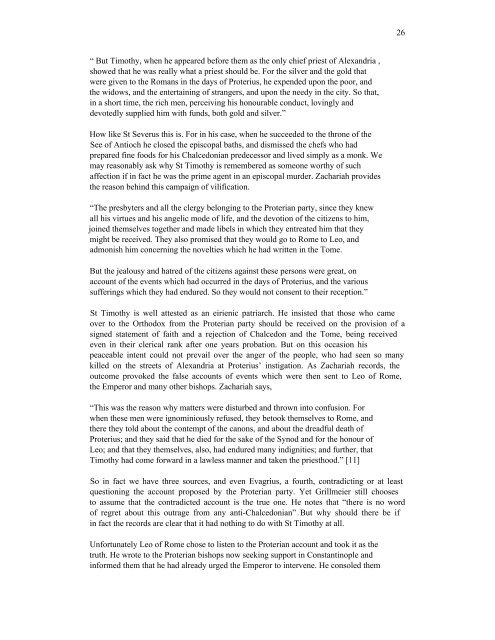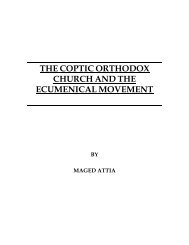Coptic interpretations of the Fourth Ecumenical Council - Saint Mina ...
Coptic interpretations of the Fourth Ecumenical Council - Saint Mina ...
Coptic interpretations of the Fourth Ecumenical Council - Saint Mina ...
Create successful ePaper yourself
Turn your PDF publications into a flip-book with our unique Google optimized e-Paper software.
“ But Timothy, when he appeared before <strong>the</strong>m as <strong>the</strong> only chief priest <strong>of</strong> Alexandria ,<br />
showed that he was really what a priest should be. For <strong>the</strong> silver and <strong>the</strong> gold that<br />
were given to <strong>the</strong> Romans in <strong>the</strong> days <strong>of</strong> Proterius, he expended upon <strong>the</strong> poor, and<br />
<strong>the</strong> widows, and <strong>the</strong> entertaining <strong>of</strong> strangers, and upon <strong>the</strong> needy in <strong>the</strong> city. So that,<br />
in a short time, <strong>the</strong> rich men, perceiving his honourable conduct, lovingly and<br />
devotedly supplied him with funds, both gold and silver.”<br />
How like St Severus this is. For in his case, when he succeeded to <strong>the</strong> throne <strong>of</strong> <strong>the</strong><br />
See <strong>of</strong> Antioch he closed <strong>the</strong> episcopal baths, and dismissed <strong>the</strong> chefs who had<br />
prepared fine foods for his Chalcedonian predecessor and lived simply as a monk. We<br />
may reasonably ask why St Timothy is remembered as someone worthy <strong>of</strong> such<br />
affection if in fact he was <strong>the</strong> prime agent in an episcopal murder. Zachariah provides<br />
<strong>the</strong> reason behind this campaign <strong>of</strong> vilification.<br />
“The presbyters and all <strong>the</strong> clergy belonging to <strong>the</strong> Proterian party, since <strong>the</strong>y knew<br />
all his virtues and his angelic mode <strong>of</strong> life, and <strong>the</strong> devotion <strong>of</strong> <strong>the</strong> citizens to him,<br />
joined <strong>the</strong>mselves toge<strong>the</strong>r and made libels in which <strong>the</strong>y entreated him that <strong>the</strong>y<br />
might be received. They also promised that <strong>the</strong>y would go to Rome to Leo, and<br />
admonish him concerning <strong>the</strong> novelties which he had written in <strong>the</strong> Tome.<br />
But <strong>the</strong> jealousy and hatred <strong>of</strong> <strong>the</strong> citizens against <strong>the</strong>se persons were great, on<br />
account <strong>of</strong> <strong>the</strong> events which had occurred in <strong>the</strong> days <strong>of</strong> Proterius, and <strong>the</strong> various<br />
sufferings which <strong>the</strong>y had endured. So <strong>the</strong>y would not consent to <strong>the</strong>ir reception.”<br />
St Timothy is well attested as an eirienic patriarch. He insisted that those who came<br />
over to <strong>the</strong> Orthodox from <strong>the</strong> Proterian party should be received on <strong>the</strong> provision <strong>of</strong> a<br />
signed statement <strong>of</strong> faith and a rejection <strong>of</strong> Chalcedon and <strong>the</strong> Tome, being received<br />
even in <strong>the</strong>ir clerical rank after one years probation. But on this occasion his<br />
peaceable intent could not prevail over <strong>the</strong> anger <strong>of</strong> <strong>the</strong> people, who had seen so many<br />
killed on <strong>the</strong> streets <strong>of</strong> Alexandria at Proterius’ instigation. As Zachariah records, <strong>the</strong><br />
outcome provoked <strong>the</strong> false accounts <strong>of</strong> events which were <strong>the</strong>n sent to Leo <strong>of</strong> Rome,<br />
<strong>the</strong> Emperor and many o<strong>the</strong>r bishops. Zachariah says,<br />
“This was <strong>the</strong> reason why matters were disturbed and thrown into confusion. For<br />
when <strong>the</strong>se men were ignominiously refused, <strong>the</strong>y betook <strong>the</strong>mselves to Rome, and<br />
<strong>the</strong>re <strong>the</strong>y told about <strong>the</strong> contempt <strong>of</strong> <strong>the</strong> canons, and about <strong>the</strong> dreadful death <strong>of</strong><br />
Proterius; and <strong>the</strong>y said that he died for <strong>the</strong> sake <strong>of</strong> <strong>the</strong> Synod and for <strong>the</strong> honour <strong>of</strong><br />
Leo; and that <strong>the</strong>y <strong>the</strong>mselves, also, had endured many indignities; and fur<strong>the</strong>r, that<br />
Timothy had come forward in a lawless manner and taken <strong>the</strong> priesthood.” [11]<br />
So in fact we have three sources, and even Evagrius, a fourth, contradicting or at least<br />
questioning <strong>the</strong> account proposed by <strong>the</strong> Proterian party. Yet Grillmeier still chooses<br />
to assume that <strong>the</strong> contradicted account is <strong>the</strong> true one. He notes that “<strong>the</strong>re is no word<br />
<strong>of</strong> regret about this outrage from any anti-Chalcedonian” But why should <strong>the</strong>re be if<br />
in fact <strong>the</strong> records are clear that it had nothing to do with St Timothy at all.<br />
Unfortunately Leo <strong>of</strong> Rome chose to listen to <strong>the</strong> Proterian account and took it as <strong>the</strong><br />
truth. He wrote to <strong>the</strong> Proterian bishops now seeking support in Constantinople and<br />
informed <strong>the</strong>m that he had already urged <strong>the</strong> Emperor to intervene. He consoled <strong>the</strong>m<br />
26








